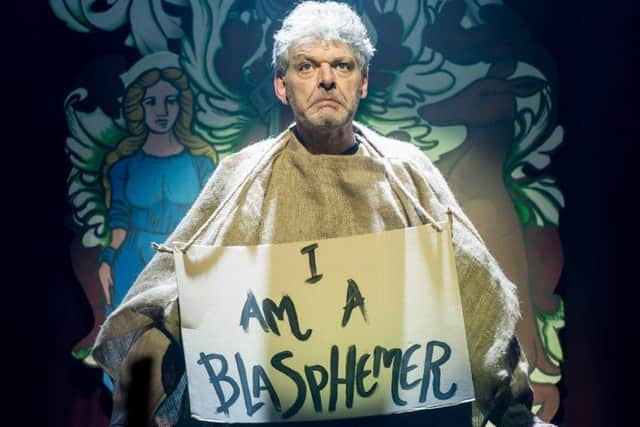I Am Thomas, a timely adaptation of a 17th century blasphemy execution


On a cold Edinburgh morning in January 1697, a young man began his last journey from the Tolbooth, where he had been held prisoner, to Gallowlee (halfway down present day Leith Walk) where he would be hanged. Thomas Aikenhead was the last person to be executed for blasphemy in the British Isles. He was 20 years old.
Aikenhead’s story has been recovered from the dark annals of Scotland’s history and made into a new piece of theatre by acclaimed company Told by an Idiot, in a co-production with the National Theatre of Scotland. But I Am Thomas emerges not as a story which belongs in punitive pre-enlightened times but one which its makers describe as “horribly prescient”. From no-platforming at British universities to the Charlie Hebdo killings, the issue of free speech continues to be a live one. I Am Thomas directly echoes “Je suis Charlie”.
Advertisement
Hide Ad“It’s probably the most relevant piece of theatre we’ve ever made,” says director Paul Hunter, founder of Told by an Idiot. The story was brought to him by Iain Johnstone, the actor, director and composer who heads up Scottish company Wee Stories. He stumbled across Aikenhead in the late 1980s, at the time of the fatwa against novelist Salman Rushdie. “I couldn’t believe that the Scottish nation had conveniently brushed this story under the carpet,” he says.


But anyone familiar with Told by an Idiot’s work will know not to expect a straight retelling. The company was among the pioneers of devised theatre in Britain, using comedy, physicality and music to tell stories, rather than bowing to the supremacy of a written script. Both Hunter and Johnstone had a strong “hunch” that they wanted to tell Aikenhead’s story in song. “There is some material which is so extreme, it lends itself to something that’s bigger than speaking,” says Hunter. “We have to find a form theatrically which matches the material”.
“I think we were both very clear we didn’t want to make a history play which was just a scramble of dates and people’s names,” says Johnstone. “People can go on to Google and find all that – we weren’t making a docu-drama.” I Am Thomas, “a brutal comedy with songs”, is a colourful romp which looks like the 1690s filtered through the 1970s, and sounds rather like a musical, for which Johnstone – working with poet Simon Armitage as lyricist – has written what can only be described as some beautiful pop ballads.
Very little is known about Aikenhead, who was a student at the time of the accusations against him. He stood accused of denying the existence of God, the trinity and the deity of Christ, of arguing that Christ’s miracles were the product of magic learned in Egypt, and quipping – one chilly Edinburgh night – that he would be warmer in hell. In the Scotland of the time, where an extreme Presbyterian faction governed the church, his mish-mash of “heterodox” ideas cost him his life. The story is all the more ironic because, 50 years later, Edinburgh would become the cradle of the Enlightenment.
The makers of the show feel that Aikenhead was neither a hardline atheist nor a martyr to the cause of free-speech, just a young man with a big mouth who was in the wrong place at the wrong time. Armitage says: “When I think about what I said when I was his age, I wouldn’t want to he held accountable. I don’t think he was an extraordinary person with very dogmatic ideas, he was just young, ebullient, curious, and made the mistake of airing his views in front of the wrong people. Quite a lot of the projects I’ve worked on have at their centre the absence of a voice. When someone’s had their voice taken away, or they’ve been gagged, or they’re not able to speak clearly, I see that as an opportunity to step in and fill the space.”


This enables the company to work with the idea of Aikenhead as an everyman figure. All eight of the actors in the ensemble – who are a range of ages, genders and ethnicities – take turns to play Thomas. “That’s a decision we made early on,” says Hunter. “If we’re really interested in this everyman figure of Thomas, we should take it further in the form of the show.” He adds the show comes together through “juxtaposition and counterpoint”: then and now, speech and song, humour and seriousness. One minute, Lord Advocate James Stewart, Aikenhead’s prosecutor, is wearing a 17th century wig and frockcoat, the next the presenters on Match Of The Day in the 1970s are discussing the career of a promising young footballer gone sadly awry.
Advertisement
Hide AdThere are allusions to movies ranging from The Godfather to the Life Of Brian, and the work of Swedish director Roy Anderson, as well as the work of Scottish theatre companies such as Communicado and 7:84, which integrated music with straight acting to great effect.
Hunter says: “It felt absolutely vital to me that this felt like a really strong, vibrant piece of contemporary theatre. If you have Stewart dressed in a wig when he interviews Thomas Aikenhead, I wanted the dialogue to feel like an episode of The Bill, so the audience are constantly jolted back into the present. They’re not allowed to think ‘This is just something that happened 400 years ago’.”
Advertisement
Hide AdAt the same time, he says the contemporary relevance of the story is so evident it doesn’t need to be hammered home. “I’m very wary of shoe-horning or making too overt a contemporary political parallel because it reduces the play very quickly. You have to trust the story you’re telling, and I think we all trust the story enough.”
A crucial element, as to all of the Told by an Idiot’s work, is humour. Aikenhead’s story is hardly funny, but there is much laughter in the retelling – one newspaper called it “the ultimate example of gallows humour”. Humour used appropriately, Hunter says, will not only engage an audience more deeply, and give a show more emotional range, it will reveal more of the humanity of the story. “The darker the material, the more important it is to find humour, in the right context,” he says. “For me the most potent anti-war film I can think of is not Paths Of Glory or any of the big Vietnam films, it is the Marx Brothers’ Duck Soup. I think there’s a lot of rubbish spoken about rules of theatre. There are no rules. The only rule is don’t be boring.”
• I Am Thomas is at the Lyceum Theatre, Edinburgh, Wednesday until 9 April